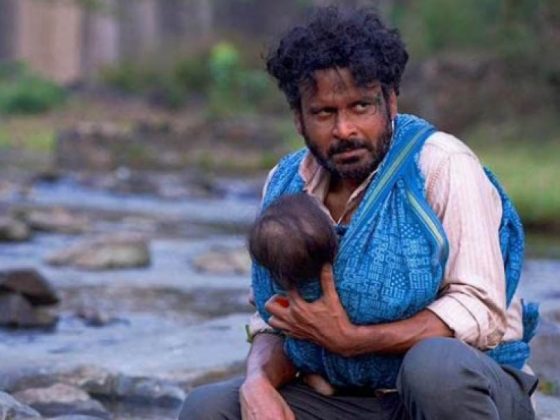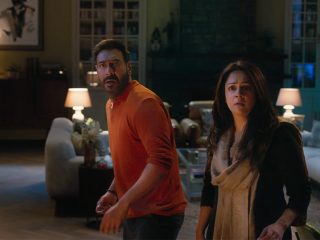Stolen is an independently made movie with an ambition that is reaching for the stars. You can credit director Karan Tejpal and producer Gaurav Dhingra for saying that it doesn’t look like an independently made film, at least for the majority of the film’s runtime.
For a genre film template, the best idea is to jump on the narrative right away. A baby stolen from the clutches of an indigenous woman sleeping on a bench in a railway station sparks the inciting incident. The thief is witnessed by Karan Bansal, a man who has just arrived via train and would now accompany his yuppie brother Gautam (Abhishek Banerjee) to their mother’s marriage, a lavish and posh affair as it appears from Gautam’s mannerism, dress, and a 1,50,000/- watch. Contrast that with the current situation that the two brothers find themselves in. Previously, Gautam wanted to ensure that the accused, his brother, would walk away without incident and that this would be resolved peacefully. It starts to get complicated when Karan too has a moral conscience and wants to help Jhumpa Mahato, the victim of the child kidnapping. The police officers investigating the case are none too happy to be questioned about their interrogation methods, and thus they force the brothers to accompany them to find the missing child, as they are witnesses.
What strikes me in the first half is how neatly and almost throughout the narrative, a neo-noir tone of bleakness permeates the film. There is a sense of anxiety as the movie progresses, with twists and turns coming at regular intervals in the narrative to make the screenplay fairly engaging, but there is a growing sense of anxiety and paranoia as the movie inches closer and closer to the second act. One can argue that the neo-noirish nature of the film stems from how the movie looks and how the film is framed—mostly long takes with extended moments within the vehicle and minor establishing drone shots to frame the location. But it could be taken as a damning statement that the genre template, which also explores social evil, feels highly realistic. Paranoia and anxiety arise because the events that occur are ripped from the headlines, and they are news features that get lost in the miasma that is India.
In these circumstances, privileges, especially those carried by Gautam and Karan, are enough of an insulation from all these social issues. But Tejpal, Dhingra, and co-writer Agadbumb’s tense screenplay takes into account one of the great equalisers of the 21st century, which tends to be an easy tool for radicalization, fostering mistrust, and peddling misinformation—the presence of affordable internet and access to social media. As a result, news without confirmation and obfuscated information spreads like wildfire, and the mob mentality becomes a terrifying prospect, leading to the second half becoming a survival thriller.
The ambitions of Tejpal and his team are almost profoundly and movingly huge. Inspired by George Miller’s 2015 Mad Max Fury Road, the chase sequence is designed in a fashion that should be applauded for its execution, even though some of the limitations are readily apparent. The problem, though, lies again in its acknowledgement of the genre template. The movie’s buildup of anxiety and dread would also be heightened by the lack of a discernible score throughout the first half, which suddenly becomes punctured when a pulsating, exciting score befitting an action scene enters the picture. It was unnecessary and took away the effectiveness of that chase from being a raw and gritty one.
Amidst all of these, the performances from the central cast are all on point, though the presence of a character arc through the entirety of this story is afforded to Gautam, and Abhishek Banerjee plays that character with ease. Getting the opportunity to sink into this realistic individual, the effects of this potent and terrifying night transformed him from a selfish to an empathetic individual. Shubham, who plays the role of Karan, has a believable chemistry with Banerjee as the two combative brothers, and he is afforded the role of the moral conscience. One could argue that the backstory of their strained relationship is hardly brushed off and has underdeveloped details, which again proves the axiom that no backstory is better than an underdeveloped one. Hints of a strain are enough, as are throwaway lines, which would work to enhance the characters just about enough. A movie’s potency remains within its runtime, and for a movie as taut as this, these are ancillary elements. Mea Melzer as Jhumpa is also impressive, especially in terms of her physical presence and even in depicting the vulnerability of her character and the sometimes slippery nature of her character used to survive in a world not kind to individuals like her.
Independent movies always require a modicum of ambition to make them work, and for a movie so heavily invested in its genre template, choosing that template to comment on a relevant issue is already ambitious enough. The fact that it overshoots itself by a mile does tend to distract, but it rights itself by the final second. The final twist rests on a coincidence, which feels believable because it doesn’t come out of nowhere; rather, it has been teased from the first act itself. At its core, Stolen is a highly engaging and atmospheric thriller. It would have helped, though, if the opening text of “The Two Indias” had been removed, leaving the viewers to trust the narrative.











